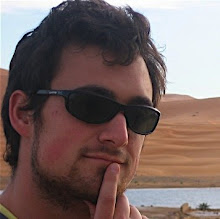We caught a bus on the side of the road headed for Honduras. The dusty, dusty--can't emphasize that enough--dusty, rocky road winds up, down, and around the border mountains. People had to cover their faces with scarves and cloths to block out the dust and babies were buried beneath blankets by protective mothers. The border was not much of a border--no gates or demarcation, no stamps. There wasn't even a representative from El Salvador present. Our border crossings have been hit or miss--sometimes you pay unoffical "fees," sometimes you walk right through. Here, the Honduran official that boarded our bus tried to hassle me a bit, but thankfully let it go and sent us along with a smile.
A couple hours later we arrived in Marcala, a small town surrounded by fragrant coffee plantations and beautiful countryside, but itself a dusty, dirty, and dodgy place. We just spent the night and headed out in the morning for La Ceiba, on the Caribbean coast. A two hour bus ride to the side of a highway, a half-hour bus to a larger town, a three hour bus to the large city of San Pedro Sula, and a four hour bus to La Ceiba got us there by evening.
In a relatively short time we had been transported to quite a different world. Coastal Honduras, in contrast to inland Central America, is heavily influenced by its Afro-Caribbean population. There is a definitive "island" vibe in the food, music, and people. The town is known for its parties, so we drank cheap rum on the beach and went out to a local disco which, despite the crumminess of the town, was fancy enough for any European city.
The next morning we boarded a ferry for Utila, the cheapest of the three famous "Bay Islands." After an hour and a half struggling not to vomit, we arrived to a strikingly "white" bunch of salesmen, all pushing various dive courses and hotels. The island has developed a world-famous diving industry, and many travelers and expats end up living in Utila owning, operating, or working in dive shops, restaurants, hotels, and related businesses. Almost all travelers are in Utila to get certified, so we baffled with our plan to just "chill out."
I'm honestly not very clear on the island's history, but English is the official language and the local population seems to be a mixture of white colonial descendents and afro-caribbean descendents of slaves. The owner of our hotel lamented that they are governed by Honduras and made clear that her daughter "don't speak no Spanish."
The ferry to get to the islands was quite expensive ($23 each way), so we lived a spartan existence in our time there, abstaining from alcohol and cooking our own rice and beans with sparing amounts of vegetables.
We spent a lot of time at the beach. One day we rented a kayak and paddled out to Water Cay, a deserted island with picture-perfect beaches, palm trees, and turquoise water. We ended up missing Water Cay and landing on another small island that had a deserted house on it. Nobody else showed up and we had the place to ourself, save for the pelicans. We collected coconuts, paddled out to deep waters for a swim, and just lazed around in complete serenity. The coconuts proved difficult to open, but we perfected a technique that involved a 50lb piece of coral and were savoring the milk and meat in no time.
After a few lazy days we embarked on a grueling day of travel--16 hours of ferries, taxis, buses, and minibuses to get to Flores, Guatemala, jumping off point for tours to the epic Mayan ruins of Tikal.
Sunday, March 29, 2009
Subscribe to:
Post Comments (Atom)




No comments:
Post a Comment